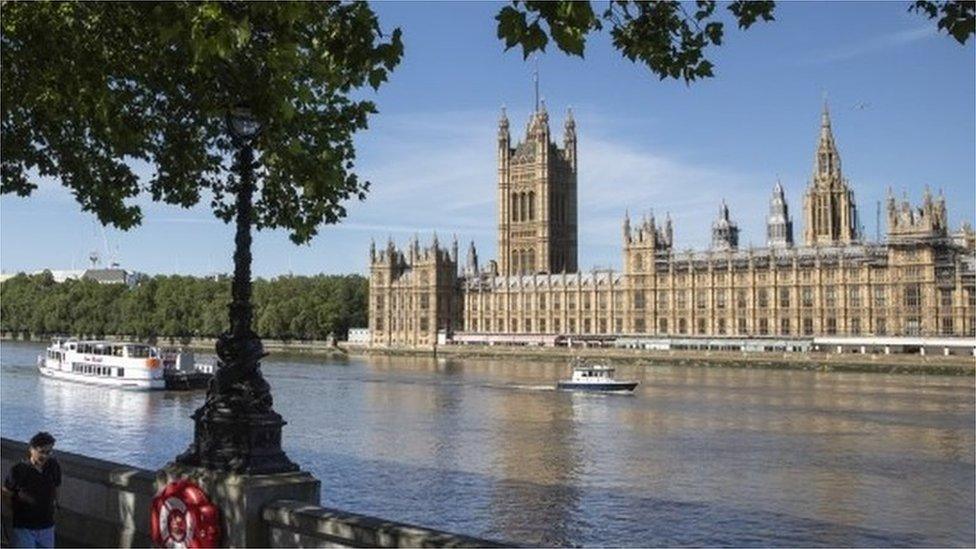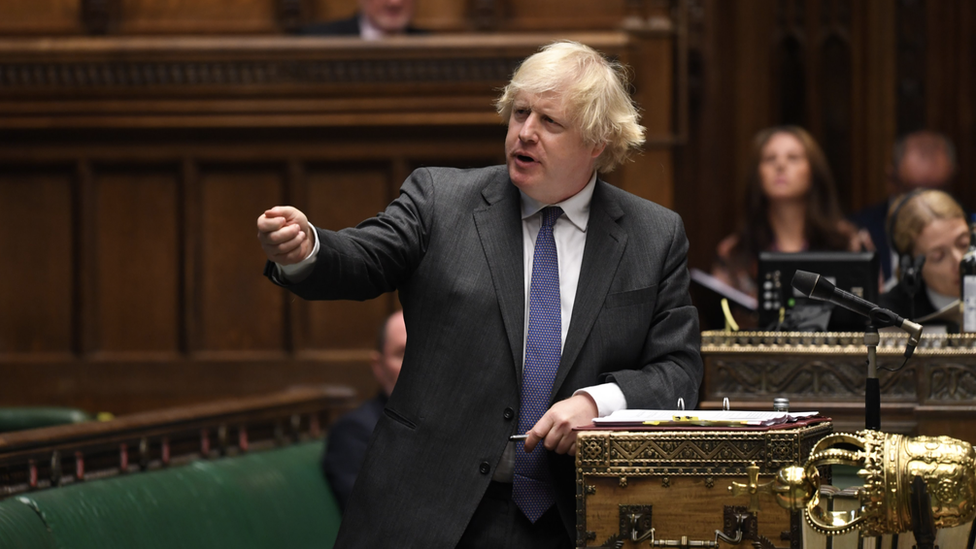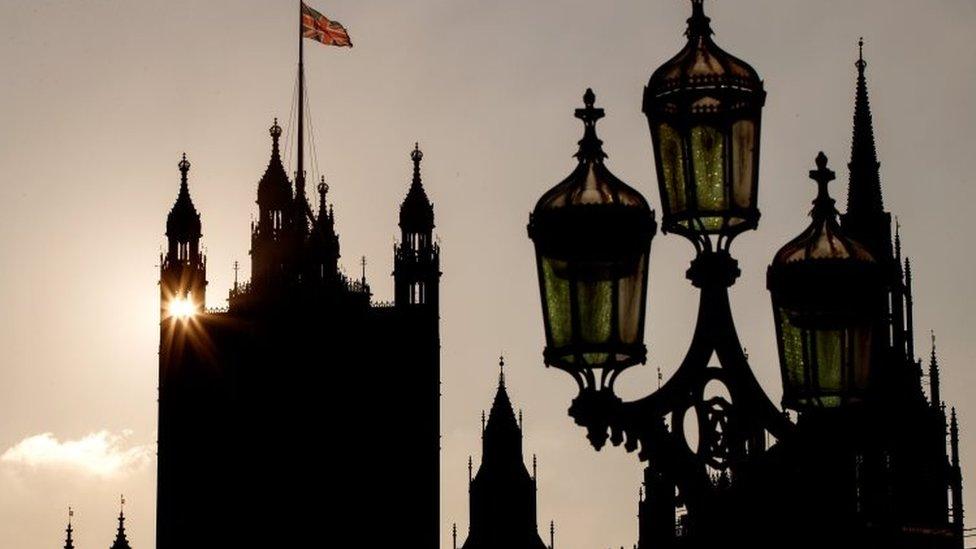The week ahead in Parliament
- Published

The lesson of the last few weeks is that the government's majority is not quite as solid as the raw Commons numbers make it appear, and that Conservative backbenchers, especially heavy metal ex-ministers, have few inhibitions about putting down serious amendments to government legislation.
This week sees one case in point, in the shape of the amendment on family reunion for children to the Immigration Bill, which could make life interesting for the whips.
A longer term prospect is the Lords amendment to the once blandly technical Telecoms Infrastructure Bill; if the government fails to prevent Lord Alton's amendment on slavery in the supply chain, there might not be a majority for striking it down, when the Bill bounces back to the Commons - where it mainlines into gathering Conservative anxieties about China.
Those anxieties will also be visible at the big defence committee meeting on Tuesday, where two cabinet ministers face a grilling over the security issues raised by Chinese involvement in building the UK's 5G digital network.
Meanwhile there is plenty of pandemic-related action. An emergency bill to ease the end of the lockdown, plenty of coronavirus-related changes to the Finance Bill, and any number of select committee hearings on different aspects of the coronavirus outbreak. Plus, no doubt, the weekly helping of ministerial statements on the latest developments.
Here's my rundown of the week ahead:
Monday 29 June
The Commons opens (14:30) with work and pensions questions, doubtless to be followed by the usual post-weekend crop of ministerial statements and urgent questions.
The main legislation is the Business and Planning Bill - a package of punter-friendly measure to ease the transition out of lockdown. All stages of the bill will be completed on the day, with four hours set aside for the second reading (minus whatever time is spent on the timetable motion).
The bill will allow pavement licences (to allow a business to put tables and chairs on nearby pavements or car parks, but only to sell or serve food or drink) and the extension of alcohol licences so that on-sales licences are extended to include off-sales licences until the end of September 2021.
The "business" section of the bill disapplies the "unfair relationships" provisions for bounce back loans - to allow continued rapid access for businesses to loans - allows construction companies to apply to be able to work for longer hours or on days they aren't usually allowed to work and gives more flexibility on planning rules (such as duration of planning permissions and other extension of deadlines).
The day ends with a pleasingly elegiac adjournment debate, led by the Conservative Lee Rowley, celebrating the 150th anniversary of Dronfield Station, opened by the then Midland Railway in 1870. It serves the largest town in his North East Derbyshire constituency, now used by 200,000 passengers a year.
The public accounts committee (14:30) takes evidence on improving the prison estate, after a National Audit Office report found that prisoners are being held in unsafe and crowded conditions, with key indicators of poor safety in prisons - prisoner assaults on staff, self-harm, prisoner-on-prisoner assaults - at an all-time high. Prison buildings continue to deteriorate and there is a severe maintenance backlog. Sir Richard Heaton, the permanent secretary at the Ministry of Justice and officials from the Prison and Probation Service are before the committee.
Housing, communities and local government (15:30) looks at the impact of coronavirus on homelessness and the private rented sector, with witnesses from campaigning groups Shelter and Generation Rent, plus the National Residential Landlords Association.
In the Lords (14:30) ministers face questions on supporting victims of domestic abuse during the pandemic, reducing the number of short prison sentences, the impact of Covid-19 on the airline sector and the government's relationship with the government of China.
Then peers perform their last rites over the much amended Private International Law (Implementation of Agreements) Bill before sending it off to the Commons. This will probably be a fairly perfunctory ritual.
But watch out for the next business, the report stage consideration of the Telecommunications Infrastructure (Leasehold Property) Bill. There was talk of a specific amendment aimed at excluding the Chinese telecoms firm Huawei from the UK's 5G network, on security grounds. But with a government security review due soon, the company's critics are attacking from another angle, with an amendment from the independent peer, Lord Alton, targeting human rights abuse and the use of modern slavery in the supply chain.
There is some debate as to whether this is within the scope of the Bill, and Labour have not (at the time of writing) swung in behind Lord Alton, but the word is they are warning ministers that they need to come up with alternative to put before the House at third reading, or face probable defeat on the Alton amendment, and serious problems with the fast increasing China-sceptic lobby in the Commons.
Peers will also be asked to approve the Public Service Vehicles (Open Data) (England) Regulations 2020 - a measure which is intended to provide bus passengers in England (outside Greater London) with more information to make journey planning easier, to help reverse the continuing decline in bus travel outside the capital. The idea is to provide a publically available dataset on fares, frequency etc, which independent developers will rapidly create an app to interpret.
Tuesday 30 June
MPs begin their day (11:30) with foreign and commonwealth office questions, The day's ten minute rule bill, from the Conservative Sir Geoffrey Clifton-Brown, is on New Homes (New Development Standards). It would require developers to meet minimums on insulation, broadband connectivity and electric car charging points.
The main legislative action will be the report and third reading stages of the Immigration and Social Security Co-ordination (EU Withdrawal) Bill. A cross-party amendment has gone down to ensure the continuation of existing arrangements for unaccompanied asylum-seeking children, spouses and vulnerable adults to have access to family reunion with close relatives in the UK. Those arrangements are due to expire at the end of the Brexit transition period in December with no replacement yet proposed by ministers.
The backers of the amendment, who include the home affairs select committee chair, Labour MP Yvette Cooper, and the senior Conservative on the committee and former children's minister, Tim Loughton, fear that the result could be child refugees could be left vulnerable to trafficking and exploitation. The amendment has a formidable-looking list of backers, including, crucially, a number of senior Conservatives, like the former international development secretary, Andrew Mitchell. This could well prod the government into offering its own proposal on the issue.
The adjournment debate, led by Labour former minister Meg Hillier, focuses on the issues around black women facing high rates of domestic abuse - but facing discriminatory responses when they seek help within their communities and from outside bodies. She is concerned about the funding available for smaller specialised organisations which provide help.

There's a great deal of select committee action, with digital, culture, media and sport (09:30) quizzing Richard Masters, the chief executive of the Premier League, and Scott Lloyd of the Lawn Tennis Association about the impact of the pandemic. Environmental Audit looks at the sustainability of the Ministry of Defence (09:30) with Defence Procurement Minister Jeremy Quin and top brass from the MoD.
The committee on the future relationship with the European Union (10:30) hears from representatives of Brits in EU countries, and justice hears evidence on the impact of the pandemic on the prison and probation system.
Health and social care (10:00) round off their inquiry into delivering core NHS and care services during the pandemic with evidence from key NHS leaders on plans to manage the growing waiting times and back-log of demand that has built up during the pandemic. In earlier hearings the committee heard from patients facing delays to surgery and treatment, and evidence on the numbers waiting for cancer screening and testing, with the prediction that thousands of cancers will have been missed. The witnesses include Chris Hopson of NHS Providers and the NHS England chief executive, Sir Simon Stevens.
The special defence sub-committee looking at the security of 5G has a cabinet double-act before them: Defence Secretary Ben Wallace and Culture Secretary Oliver Dowden (14:30) - plus Ciaran Martin of the National Cyber Security Centre - as it ponders whether Huawei should be allowed to supply infrastructure for the UK's new 5G digital network.
Given that the government is conducting a review of the issues raised by Huawei's involvement, it may be difficult for them to say too much, but the session may then evolve into a wider look at the issues around China - events in Hong Kong and other foreign policy/security challenges - as well as taking in the government's ability to tackle urgent operational challenges.
Environment Secretary George Eustice will be questioned by his departmental committee on the impact of coronavirus on the UK food supply chain, communication with retailers and consumers during panic buying, and the reopening of the food service industry. The session will also consider support available during the pandemic to allow society's most vulnerable groups to access healthy food. The committee will probe the preparations for leaving the EU, including immigration policy for seasonal workers, and fisheries negotiations. (14:30).
In the Lords (11:00) question time covers reform of the law on marriage and religious weddings, support to assist universities dealing with the pandemic and support for women's sport.
The main legislative action is the first day of report stage consideration of the Pension Schemes Bill - a measure to improve the system, including facilitating an online "pensions dashboard". There are likely to be three votes on amendments led by Labour peers Baroness Sherlock and Baroness Drake - two on 'dashboard' issues and one on buffer funds. If the debate goes long, the dashboard amendments could end up being debated on the yet to be scheduled second day of report stage.
Wednesday 1 July
The Commons meets (11:30) for half an hour of Scotland questions, followed at noon by Prime Minister's Question Time.
The day's ten minute rule bill, from the SNP's Pete Wishart, would create a formal parliamentary process to nominate the prime minister and appoint the cabinet.
Then there's a motion to appoint a new chairman of the National Audit Office, to replace Lord Bichard, who's standing down. Such is the stature of the NAO that its head official has to be nominated by the prime minister.
The main legislative action is the consideration of the Finance Bill, which enacts the measures announced in the Budget - if you can remember back to those distant pre-lockdown days. Things have changed so much that there are significant government amendments to update the bill, for example on taxation of coronavirus support payments, protected pension age of members re-employed as a result of coronavirus, interest on unpaid tax in case of disaster of national significance, and several more.
There are Labour amendments calling for reviews of the impact of the legislation on jobs, poverty and the environment, while the SNP has amendments down calling for a review of the impact of the general anti-abuse rule on taxes and the impact of the digital services tax. The usual drill for finance bills is for opposition parties to seek reviews and reports, rather than to directly tinker with taxation measures.
It's a busy day on the committee corridor with work and pensions (09:30) questioning the architect of the Universal Credit system, Sir Iain Duncan Smith, on the controversial wait for a first payment. Transport (09:30) begins a new inquiry on e-scooters (pavement nuisance or transport innovation?) with evidence from academics, and road and pavement user groups. Home affairs (10:30) looks at the work of the Home Office from its top civil servants, the treasury committee (14:30) hears from economists about the economic impact of coronavirus, and the women and equalities committee (14:30) continues its inquiry into the unequal impact of coronavirus on people with protected characteristics.
In the Lords (11:00) questions to ministers cover the working of the new social distancing rules on public transport, sourcing strategic goods from the UK rather than China, and the impact of the pandemic on mental health.
Then comes the third reading of the Fisheries Bill - sending another amended piece of legislation to the Commons.
Then, peers turn to the report stage of the Prisoners (Disclosure of Information About Victims) Bill, which is intended to ensure that the Parole Board takes into account that a killer has refused to disclose the location of a victim's remains when assessing possible release on parole. The same provision applies to offenders who will not disclose the names of children featured in indecent photographs. The key amendment is a cross-party effort, led by the (newly non-aligned) Baroness Kennedy of Cradley, to impose a requirement for the Parole Board to keep a database of victims' family members, in order to keep relatives informed about an offender's parole application.
Thursday 2 July
MPs begin (09:30) with transport questions, followed by the weekly business statement from the leader of the House, Jacob Rees-Mogg. After that they polish off the remaining stages of their consideration of the Finance Bill,
On the committee corridor, public administration and constitutional Affairs (09:30) takes evidence on the work of the Electoral Commission from its top officials. And Scottish affairs (14:30) continues its hearings on coronavirus and Scotland.
In the Lords (11:00) question time covers the availability of mental health services in acute and community care settings during and after the pandemic, the impact of coronavirus on high street retailers, and reducing the amount of ultra-processed foods available for purchase in the UK.
Then, peers deal with a series of orders and regulations - the Contracts for Difference (Electricity Supplier Obligations) (Amendment) (Coronavirus) Regulations and the Electricity Capacity (Amendment etc.) (Coronavirus) Regulations deal with the ramifications of the fall in demand for electricity during the pandemic. And the Higher Education (Fee Limits and Student Support) (England) (Coronavirus) Regulations loosen the rules on student numbers to allow higher education institutions to cope with a possible fall in the number of students in the coming academic year.
Neither House sits on Friday 3 July.
- Published24 June 2020

- Published23 June 2020

- Published19 June 2020
